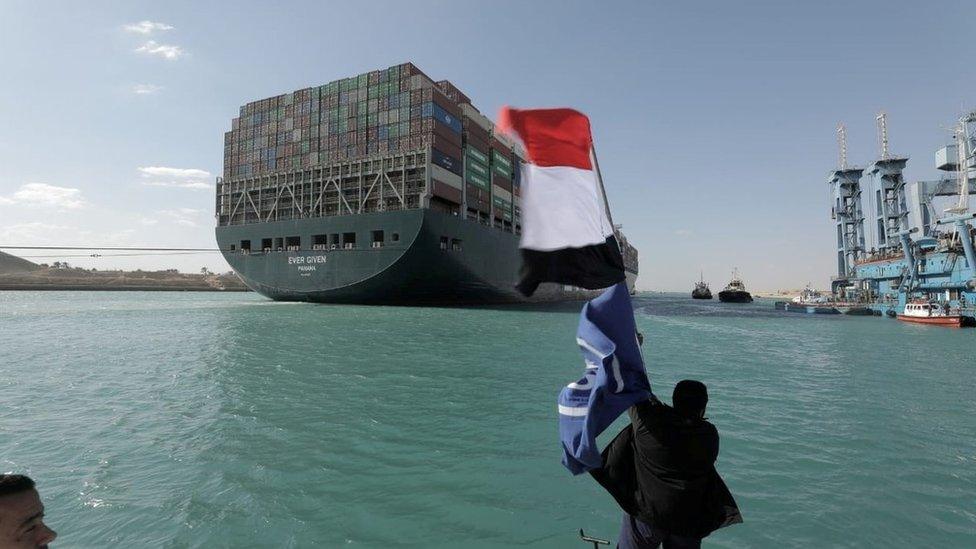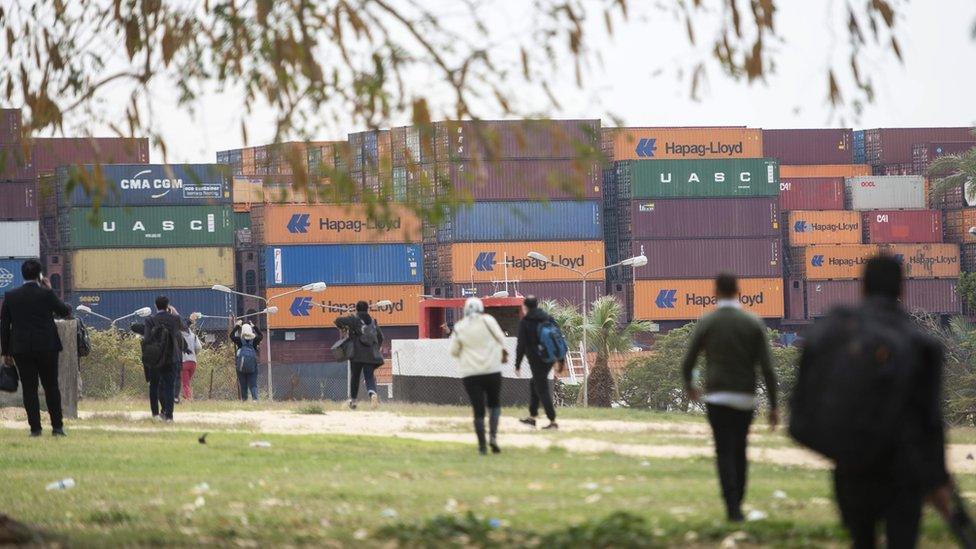Suez Canal: Ships begin sailing through cleared waterway
- Published

The Ever Given was refloated after a salvage operation involving a flotilla of tug boats and dredgers
Ships have started sailing through Egypt's Suez Canal again, a day after a giant container vessel blocking the vital trade route was freed.
Thirty-seven ships that were struck at the midway point cleared the waterway overnight, while 70 others are due to travel its entire length on Tuesday.
The canal authorities hope to clear the traffic jam of some 300 vessels waiting to use it within three-and-a-half days.
Meanwhile, the freed ship will be inspected for seaworthiness by experts.
The 400m-long (1,312ft), 200,000-tonne Ever Given became wedged diagonally across the canal a week ago after running aground amid high winds.
It was refloated on Monday afternoon after a salvage operation involving a flotilla of powerful tug boats and dredging vessels that shifted 30,000 cubic metres (1,059,000 cubic ft) of mud and sand.
(29 March 2021) The stranded container ship is seen finally on the move and no longer blocking the canal
About 12% of global trade passes through the 193km (120-mile) canal, which connects the Mediterranean Sea to the Red Sea and provides the shortest sea link between Asia and Europe.
At a news conference on Monday night, the head of the Suez Canal Authority (SCA), Osama Rabie, declared that it would be running at full capacity to clear the backlog as soon as possible.
"We won't sleep. This is a new challenge we are working on," he said. "We will work around the clock until we get through the ships. We have faith in this."
Canal services provider Leth Agencies said 306 vessels were waiting as of Tuesday morning - 163 at Suez in the Red Sea, 137 at Port Said in the Mediterranean, and six at the Great Bitter Lake, a wide stretch of water that marks the midway point.
Forty-five ships are currently sailing southwards in two convoys, one of which will rendezvous with the six vessels in the lake, while 25 vessels are moving northwards from Suez. The average transit time is between 11 and 12 hours.
What's happening to the Ever Given?
The ship is anchored in the Great Bitter Lake, where it is undergoing "an inspection of its seaworthiness", according to its operator Evergreen Marine.
"The outcome of that inspection will determine whether the ship can resume its scheduled service," the Taiwanese company said on Monday.


The Ever Given's technical managers, Bernhard Schulte Shipmanagement (BSM), said there had been no reports of pollution or cargo damage.
It added that initial investigations suggested the vessel ran aground due to strong wind. They also ruled out any mechanical or engine failure as a cause.
Authorities have left open the possibility of a technical or human error by the ship's crew or the two Egyptian canal pilots who were on board at the time.

Container ships passed the city of Ismailia, located on the west bank of the canal, on Tuesday
Mr Rabie said the incident was not simply the result of the weather, noting that many ships had passed through the waterway in worse conditions.
"The Suez Canal has never been closed because of bad weather," he stressed.
He also denied size was a factor, saying larger ships had used the waterway.
How has global trade been affected?
The blockage held up an estimated $9.6bn (£7bn) of goods each day, according to data from Lloyd's List.
Michelle Wiese Bockmann, an analyst at the shipping journal, told the BBC that the delays would not disappear quickly.
"It will take a couple of weeks to clear the backlog. And then, of course, you have the issue, especially with container ships, [of the vessels] all arriving at once at European ports, causing widespread congestion and delays that will trickle all the way down throughout the container shipping sector," said.
"It will delay empty boxes getting back to China and to Asia to load goods, and then there will be congestion at those ports."
With cargo vessels reaching their destinations much later than planned, future sailing schedules will also have been thrown into disarray, says BBC business correspondent Theo Leggett.
Experts say the cost of shipping goods to Europe is likely to rise as a result.
All of this comes at a time when delicately balanced supply chains are already struggling to cope with the impact of the Covid-19 pandemic.
Further disruption simply raises the risk of delays, higher prices or even shortages for businesses and consumers, our correspondent adds.